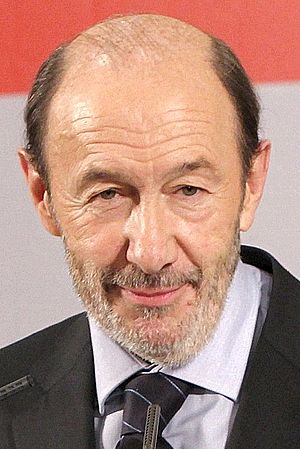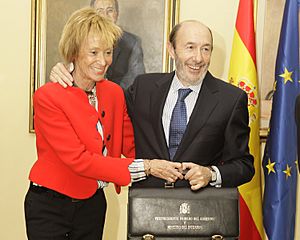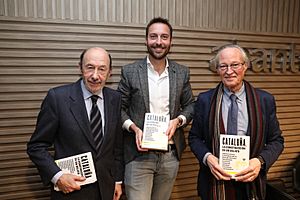Alfredo Pérez Rubalcaba facts for kids
Quick facts for kids
The Most Excellent
Alfredo Pérez Rubalcaba
|
|
|---|---|
 |
|
| Leader of the Opposition | |
| In office 20 December 2011 – 26 July 2014 |
|
| Monarch | Juan Carlos I Felipe VI |
| Prime Minister | Mariano Rajoy |
| Preceded by | Mariano Rajoy |
| Succeeded by | Pedro Sánchez |
| Secretary General of the Spanish Socialist Workers' Party |
|
| In office 4 February 2012 – 26 July 2014 |
|
| President | José Antonio Griñán |
| Deputy | Elena Valenciano |
| Preceded by | José Luis Rodríguez Zapatero |
| Succeeded by | Pedro Sánchez |
| First Deputy Prime Minister of Spain | |
| In office 21 October 2010 – 12 July 2011 |
|
| Prime Minister | José Luis Rodríguez Zapatero |
| Preceded by | María Teresa Fernández de la Vega |
| Succeeded by | Elena Salgado |
| Spokesperson of the Government | |
| In office 21 October 2010 – 12 July 2011 |
|
| Prime Minister | José Luis Rodríguez Zapatero |
| Preceded by | María Teresa Fernández de la Vega |
| Succeeded by | José Blanco López |
| In office 13 July 1993 – 6 May 1996 |
|
| Prime Minister | Felipe González |
| Preceded by | Virgilio Zapatero Gómez |
| Succeeded by | Miguel Ángel Rodríguez Bajón |
| Minister of the Interior | |
| In office 11 April 2006 – 12 July 2011 |
|
| Prime Minister | José Luis Rodríguez Zapatero |
| Preceded by | José Antonio Alonso |
| Succeeded by | Antonio Camacho Vizcaíno |
| Minister of Defence Interim |
|
| In office 20 May 2008 – 30 June 2008 |
|
| Prime Minister | José Luis Rodríguez Zapatero |
| Preceded by | Carme Chacón |
| Succeeded by | Carme Chacón |
| Leader of the Spanish Socialist Workers' Party in the Congress of Deputies | |
| In office 14 March 2004 – 11 April 2006 |
|
| Preceded by | Jesús Caldera |
| Succeeded by | Diego López Garrido |
| Minister of the Presidency | |
| In office 13 July 1993 – 6 May 1996 |
|
| Prime Minister | Felipe González |
| Preceded by | Virgilio Zapatero Gómez |
| Succeeded by | Francisco Álvarez Cascos |
| Minister of Education and Science | |
| In office 24 June 1992 – 12 July 1993 |
|
| Prime Minister | Felipe González |
| Preceded by | Javier Solana |
| Succeeded by | Gustavo Suárez Pertierra |
| Member of the Congress of Deputies | |
| In office 5 December 2011 – 2 September 2014 |
|
| Constituency | Madrid |
| In office 24 March 2008 – 13 December 2011 |
|
| Constituency | Cádiz |
| In office 31 March 2004 – 15 January 2008 |
|
| Constituency | Cantabria |
| In office 26 March 1996 – 2 April 2004 |
|
| Constituency | Madrid |
| In office 24 June 1993 – 9 January 1996 |
|
| Constituency | Toledo |
| Personal details | |
| Born | 28 July 1951 Solares, Cantabria, Spain |
| Died | 10 May 2019 (aged 67) Majadahonda, Community of Madrid, Spain |
| Cause of death | Stroke |
| Political party | PSOE |
| Spouse | Pilar Goya (1979–2019) |
| Alma mater | Complutense University of Madrid Lic., PhD |
Alfredo Pérez Rubalcaba (born 28 July 1951 – died 10 May 2019) was an important Spanish politician. He was also a chemist. He held many key roles in the Spanish government.
He served as Deputy Prime Minister from 2010 to 2011. Before that, he was Minister of Education from 1992 to 1993. He also served as Minister of the Interior for a long time.
Rubalcaba was the Leader of the Opposition from 2011 to 2014. He also led the Spanish Socialist Workers' Party (PSOE). He earned a PhD in Organic Chemistry. This was from the Complutense University of Madrid.
Contents
Early Life and Education
Alfredo Pérez Rubalcaba was born in the village of Solares. This village is in Cantabria, Spain. When he was three, his family moved to Madrid. He went to school at the Colegio del Pilar.
He studied chemistry at the Complutense University. He earned his doctorate there. Later, he became a chemistry professor at the same university. He was an expert in how chemical reactions happen.
Rubalcaba was also a keen athlete. He could run 100 meters in just 11 seconds.
Early Political Career
Rubalcaba began his political career in 1986. He was appointed Secretary of State for Education. This was his first big government role.
In 1992, he became the Minister of Education and Science. This promotion came from Prime Minister Felipe González. He worked to improve education in Spain.
After the 1993 election, he took on more roles. He became Minister of the Presidency. He was also the Spokesperson for the Government. He held these positions until 1996.
Minister of the Interior
Rubalcaba played a big part in the 2004 general election. He helped the PSOE win. After the election, he became the leader of the Socialist Group in the Congress of Deputies.
In 2006, he became the Minister of the Interior. This was a very important job. He worked on fighting terrorism in Spain. His efforts helped lead to the end of violence from ETA.
He became very popular within his party. He was reappointed Minister of the Interior in 2008.
From May to June 2008, he also served as acting Minister of Defense. He took over temporarily for Carme Chacón. He managed both roles at the same time.
In October 2010, he became the First Deputy Prime Minister. He also became the Government Spokesperson. He continued to be the Minister of the Interior.
Under his leadership, road safety improved greatly. Spain saw a big drop in traffic deaths. This made Spain a leader in road safety in Europe.
Party Leader and Later Life
In 2011, Prime Minister Zapatero decided not to run again. Rubalcaba became the main candidate to lead the PSOE. He was chosen to be the party's candidate for Prime Minister.
He resigned from his government roles in July 2011. This allowed him to focus on the election campaign. However, his party had their worst election results ever.
In February 2012, he was elected as the General Secretary of the PSOE. This made him the leader of the party. He won by a small number of votes against Carme Chacón.
In May 2014, his party did not do well in the European Parliament election. Because of this, he resigned from his leadership role. Pedro Sánchez became the new leader of the PSOE.
After leaving politics, Rubalcaba returned to teaching. He rejoined the Complutense University of Madrid as a chemistry professor. He also joined the editorial board of a Spanish newspaper, El País.
In December 2018, he was asked to run for mayor of Madrid. However, he decided not to accept the offer.
Death
On 8 May 2019, Alfredo Pérez Rubalcaba suffered a severe stroke. He was taken to Puerta de Hierro Hospital. He passed away two days later, at the age of 67.
His death led the PSOE to cancel their election campaign events. He received a state funeral at the Congress of Deputies.
See also
 In Spanish: Alfredo Pérez Rubalcaba para niños
In Spanish: Alfredo Pérez Rubalcaba para niños



